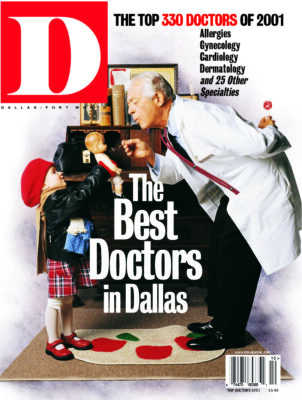Practicing medicine is not what it used to be. Gone are the “good old days” when a physician’s diagnosis was not second-guessed by a clerk working for a tight-fisted health insurance company, when reimbursements were thrice what they are now, and when doctors didn’t have to hire an MBA-led management team to shuffle around patients for referrals and verify benefits in triplicate just to get paid for their services. Doctors write checks to consultants, managers, coding experts, computer software and hardware experts, and anyone else who can help keep them afloat long enough to do what they are trained to do. And the fattest check of all goes to the malpractice insurance company.
But Dallas doctors don’t have it nearly as bad as physicians in other states. For example, compared to our local OB/GYNs who pay about $35,000 a year, Florida OB/GYNs in South Miami shell out $100,000 a year (and climbing) for malpractice insurance. In New York City, those rates can run in excess of $110,000.
And insurance is only a fraction of the cost of practicing medicine. One Manhattan physician pays $7,500 per month per doctor just in building parking fees. Average cash fee to have a baby in Dallas: $3,500. In Manhattan: $7,000. California docs are still shell-shocked by the managed care movement that rocked the state in the mid-’90s. One doctor I know sells real estate when he’s not doing brain surgery.
It’s no wonder that newly minted docs are drawn to Dallas where they can make a living on a growing population with a median age of 38.6 (with insurance coverage), be free from state income tax, and enjoy a quality of life without third-degree migraines from insurers.
“My doctors love Dallas,” says physician recruiter Janie Hirsh of Spitzmiller, Kilgore, Hobbs & Ford. “It’s really one of the last places left where there is a common bond of excellence in medicine. And even though managed care has dented incomes, they still get adequate pay and they stick together.”
Good Hospitals and Great Gizmos
Doctors love to work with the latest high-tech, life-saving, or diagnostic gadgets—radio frequency thermal ablation devices, abdominal aneurysm graphs, 3D tumor and tissue mapping systems—and they have access to this equipment in Dallas hospitals. Critics say that expensive equipment drives up the cost of health care—the more diagnostic toys they have, the more doctors will use them. Although it’s not good news if you own a health insurance company, it’s music to your ears if you’ve been diagnosed with a brain tumor.
Fewer And Less Powerful HMOs
Physicians generally snub HMOs because reimbursements are lower and there is always more red tape: referrals, paperwork, payment delays, and confusion over who’s making decisions. Many companies pay 20 percent more for the same medical procedure for the PPO patient than the HMO patient. For example, one prominent Texas HMO pays an OB/GYN about $1,500 for nine months of OB care, including the delivery. The same company’s PPO pays about $2,200. If you were a doctor, which patient would you rather see? And, lucky for us, HMOs are less powerful here than in other states. “Health insurance carriers in Pennsylvania are like the Mafia,” said one OB/GYN at a recent medical conference. “They pay when they feel like it, if they feel like it, with no penalties. Politically, Texas has a strong medical association, stronger even than the wimpy AMA.”
No Referral Necessary
Texas was one of the first states to give women the right to see their OB/GYN without a referral. Insurers are slowly catching on that all those referrals actually cost them more when the patient has to run back and forth to the primary care physician for permission to see a specialist. (It also takes them away from work and productivity.) United HealthCare no longer requires specialist referrals. Hopefully the other big insurers will catch on.
Strong Insurance Commissioner
Governor Rick Perry incurred the wrath of most Texas physicians this summer when he vetoed House Bill 1862, which would have tightened the screws on Texas’ 45-day pay law. (Under Texas law, insurance companies must pay physicians for contracted services on “clean claims” provided within 45 days. But because of the complex way claims are filed, insurers find ways to wiggle out of the law or ignore it.) To balance the scales, Perry beefed up the insurance commissioner’s powers. Recently, the state levied more than $9 million in fines against major insurers for not paying doctors. Though doctors are grateful to be paid for services rendered two years ago, only time will tell if the physicians really win: the state reaps the financial benefits, and the insurers say they will just raise premiums.
World-Class Medical Brains
Why would an obstetrician, after four years at one of the nation’s top medical schools, want to move to Dallas for his residency? For starters, the Bible of Obstetrics is written at UT Southwestern Medical School: William’s Obstetrics by Pritchard, MacDonald, Cunningham et al, current and past OB/GYN department chairs. That’s the medical text every student in the world uses to learn obstetrics. The point is that when it comes to finding a good doctor in any specialty, the best ingredient is experience. But the next step is to live in a community where the climate is such that a physician who is puzzled can call a colleague to help solve the patient’s problem. We have world-class medical minds in Dallas—four Nobel laureates work at UT Southwestern, just to name a few—which means patients here receive some of the best medical care in the world. In fact, family and friends from outside Texas call me with their medical problems, so we schedule them to fly in and see specialists here. That’s about the highest compliment that can be paid.





